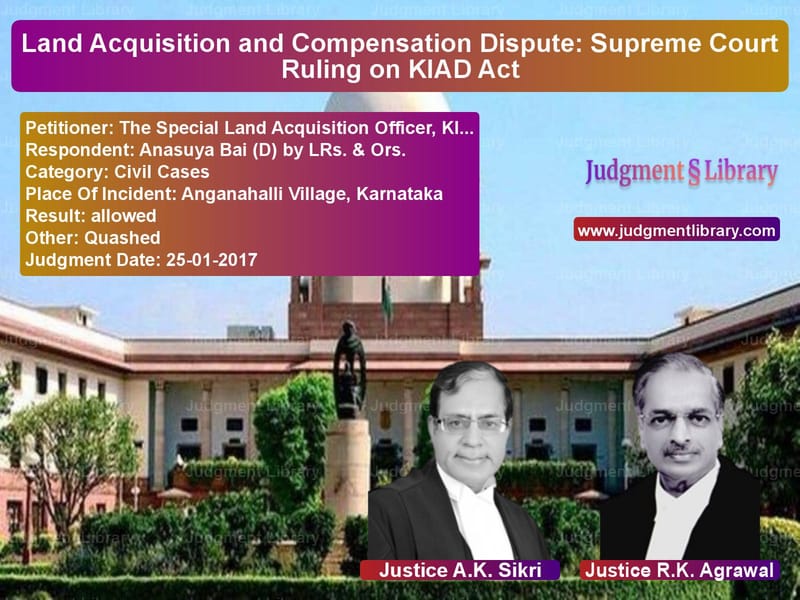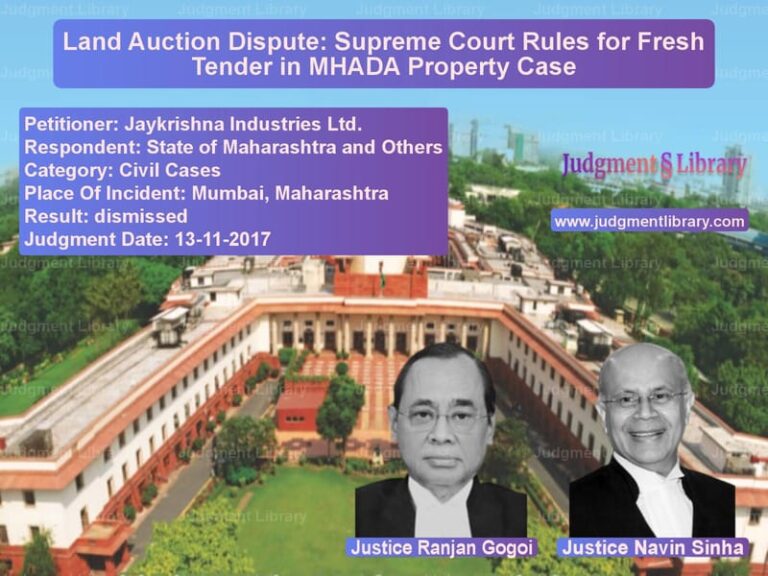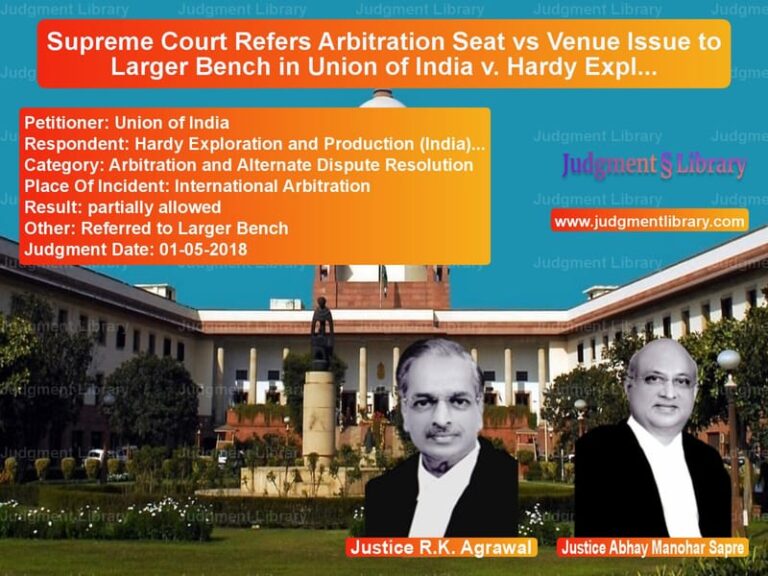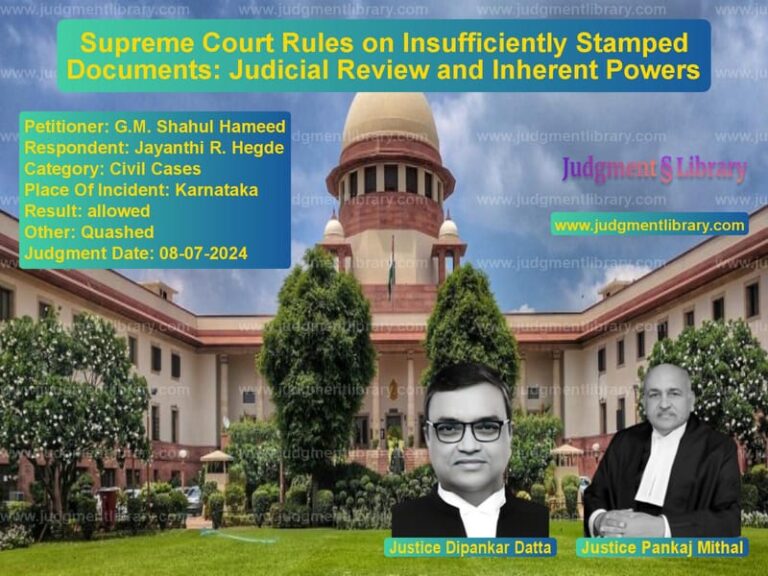Land Acquisition and Compensation Dispute: Supreme Court Ruling on KIAD Act
The Supreme Court of India in the case of The Special Land Acquisition Officer, KIADB, Mysore & Anr. vs. Anasuya Bai (D) by LRs. & Ors. addressed a critical issue related to land acquisition and compensation under the Karnataka Industrial Areas Development Act, 1966 (KIAD Act). The primary question was whether the provisions of the Right to Fair Compensation and Transparency in Land Acquisition, Rehabilitation, and Resettlement Act, 2013 (New LA Act) would apply when land is acquired under the KIAD Act. The judgment provides a detailed interpretation of the legal framework governing land acquisition and compensation.
Background of the Case
The respondents owned land situated at Anganahalli Village, Karnataka. The Karnataka Industrial Areas Development Board (KIADB) issued a preliminary notification under Section 28(1) of the KIAD Act on September 15, 2000, intending to acquire the land for industrial development. A final notification was issued under Section 28(4) on June 15, 2005, covering a total area of 153 acres and 10 guntas.
As per the KIAD Act, compensation for acquired land is to be determined through mutual agreement between the state government and the landowners, failing which the matter is referred to the Deputy Commissioner for determination. The appellants contended that compensation for the respondents’ land was fixed at Rs. 6,50,000 per acre through consensus in the Advisory Committee’s meeting. However, the respondents disputed this, claiming they were not parties to any such agreement.
Arguments by the Petitioner
- The appellants argued that the compensation was fixed through mutual consent in a meeting of the Advisory Committee held on September 9, 2005.
- The respondents’ compensation was deposited in the Civil Court due to disputes among family members regarding its distribution.
- They asserted that the acquisition was carried out in compliance with the KIAD Act and that the provisions of the New LA Act were not applicable.
- The appellants maintained that the acquisition process did not lapse since land under the KIAD Act vests in the state government upon issuance of the final notification.
Arguments by the Respondents
- The respondents denied consenting to the compensation amount fixed by the Advisory Committee.
- They contended that since no formal award was passed under Section 11 of the Old LA Act, the acquisition proceedings had lapsed under Section 24(2) of the New LA Act.
- They sought the quashing of the preliminary and final notifications, arguing that the acquisition process was legally flawed.
Legal Issues and Findings
- The Court examined whether the compensation was fixed through consensus. The Advisory Committee’s proceedings indicated a general agreement, but the respondents were not signatories to any documented consent.
- The Court reaffirmed the principle that land acquired under the KIAD Act vests in the government upon the final notification, unlike under the Old LA Act, where vesting occurs upon the passing of an award.
- The Court referred to M. Nagabhushana vs. State of Karnataka, which held that Section 11A of the Old LA Act does not apply to land acquired under the KIAD Act.
- It was observed that failure to pass an award does not render the acquisition invalid, as the KIAD Act prescribes a different mechanism for determining compensation.
Judgment
The Supreme Court concluded that the Karnataka High Court’s Division Bench erred in applying Section 24(2) of the New LA Act to land acquired under the KIAD Act. It reinstated the judgment of the Single Judge, which permitted the appellants to determine compensation afresh under Section 29 of the KIAD Act. The Court directed the authorities to complete the compensation determination process expeditiously.
Significance of the Judgment
This ruling has far-reaching implications for land acquisition cases under special statutes like the KIAD Act. It clarifies that the provisions of the New LA Act do not automatically apply to such acquisitions. The judgment underscores the necessity for clear consent from landowners when determining compensation and reaffirms the legal distinction between acquisitions under the KIAD Act and those governed by the Old LA Act.
Conclusion
The Supreme Court’s decision provides much-needed clarity on the application of land acquisition laws in Karnataka. It highlights the importance of adhering to statutory procedures and ensuring fair compensation mechanisms. The judgment reinforces that while landowners are entitled to just compensation, procedural lapses in compensation determination do not necessarily invalidate the acquisition process.
Don’t miss out on the full details! Download the complete judgment in PDF format below and gain valuable insights instantly!
Download Judgment: The Special Land Acq vs Anasuya Bai (D) by L Supreme Court of India Judgment Dated 25-01-2017.pdf
Direct Downlaod Judgment: Direct downlaod this Judgment
See all petitions in Property Disputes
See all petitions in Judgment by A.K. Sikri
See all petitions in Judgment by R K Agrawal
See all petitions in allowed
See all petitions in Quashed
See all petitions in supreme court of India judgments January 2017
See all petitions in 2017 judgments
See all posts in Civil Cases Category
See all allowed petitions in Civil Cases Category
See all Dismissed petitions in Civil Cases Category
See all partially allowed petitions in Civil Cases Category







